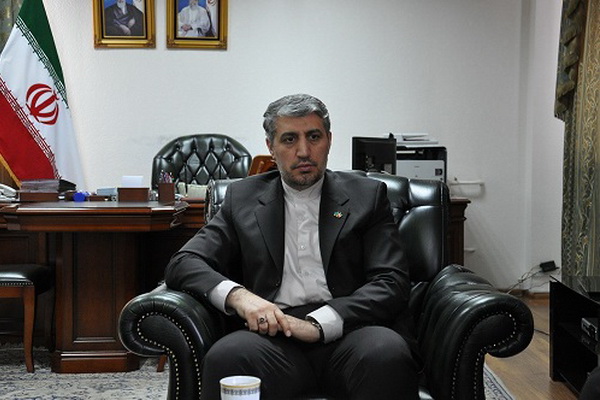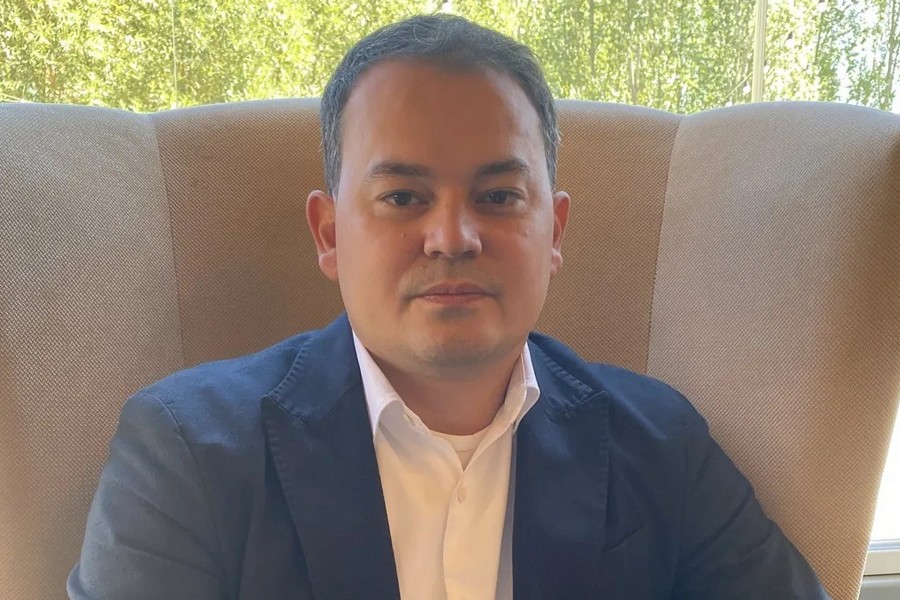Iranian Ambassador to Kazakhstan Mojtaba DAMIRCHILU:
WE HOPE TO INCREASE THE COMMODITY TURNOVER AND VOLUME OF MUTUAL INVESTMENTS BETWEEN IRAN AND KAZAKHSTAN

Last week the inauguration ceremony of President of the Islamic Republic of Iran Hassan Rouhani re-elected for the secon term was held following the results of the May elections. Ambassador Extraordinary and Plenipotentiary of Iran to Kazakhstan, Mojtaba DAMIRCHILU told Interfax-Kazakhstan about the prospects of the Kazakh-Iranian relations, as well as what will be discussed at the next round of the negotiations on the inter-Syrian settlement in Astana.
- What are the prospects for bilateral relations between Iran and Kazakhstan like given that the already time-tested partner of our country, Mr. Rouhani, was recently re-elected to the Iranian president’s post?
-Fortunately, the relationship between Iran and Kazakhstan over the past 25 years since Kazakhstan's independence has been developed dynamically, especially in the last four years during Mr. Rouhani’s presidency.
Our presidents have very good, friendly relations. Repeat mutual visits by the presidents, as well as repeat visits to Iran by Kazakhstan’s officials, holding business forums can be recognized as the evidence of these relations.
We can also say about the opening of the Kazakhstan-Turkmenistan-Iran railway. In addition, the creation of joint ventures in the transport sector is the evidence of good relations.
We hope that trade between our countries will increase in the future, as well as the volume of investments.
Lately an agreement to facilitate the issuance of tourist and business visas has been considered. I believe that with the implementation of this agreement, the necessary conditions will be created for further deepening development of the relations.
- As you reported in March, in 2016 the trade turnover between Iran and Kazakhstan amounted to $ 750 million, 15% more than in 2015. What contributed to the increase in our mutual trade turnover? What are the interim data for this year?
- The increase in trade between the countries usually depends on two factors. The first is communications; the second one is the legal basis, that is, various agreements. In 2016 these two factors contributed to the turnover increase. The launch of the North-South railway in December 2014 also had an impact on the trade level. Along with that, the necessary documents were signed, which also had their effect on this matter.
As far as the year 2017 is concerned we are awaiting official statistics. According to unofficial data, which we received from companies, we can say that there are changes in the structure of commodity turnover. For example, in recent months exports to Iran of goods such as steel and wheat have slightly decreased. At the same time, imports of oleaginous crops, fodder for animals and birds, meat from Kazakhstan to Iran have increased.
- Earlier negotiations were held on the deliveries of locomotives and Tulpar-Talgo rail carriages from Kazakhstan to Iran. At what stage is this deal now?
- Iran pays special attention to rail transportation in the transport sector. Over the past two years negotiations have been held with various companies to provide Iran with rail carriages, locomotives, rails. Various offers from Europe, Russia, India were in receipt.
Unfortunately, projects proposed by Kazakhstan given their financial standing were not suitable. To date this deal has not been implemented.
We recently signed a contract with Russia on joint production of rail carriages. We are also interested in cooperating with Kazakhstan. If the financing terms of Development Bank of Kazakhstan are attractive to the Iranian side we will be ready to cooperate.
- In the field of rail carriage imports or joint production?
- In both aspects.
- The national company Kazatomprom signed an agreement with Iran’s Atomic Energy Agency on the supply of 950 tonnes of natural uranium concentrate for a period of 3 years. At the same time, according to the Foreign Ministry, Kazakhstan has not yet applied for obtaining authorization for the implementation of this contract. Kazakhstan’s Foreign Ministry is currently in consulations on this issue with the Six-Nation Group and Iran. At what stage are these consultations?
- Under international agreements, the sale of uranium is carried out according to special rules. The agreement between the Group of Six and Iran [on the implementation of the joint comprehensive action plan on lifting sanctions against Iran] indicated that Iran could buy natural uranium. For this purpose a special mechanism is being created - the procurement channel. This procurement channel between Iran and Kazakhstan should be approved in order to get the possibility for implementing this deal.
After concluding the contract between Kazakhstan and Iran one of the countries disagreed, and at the moment this issue is being worked out. Within the framework of the agreement between the Group of Six and Iran a special commission is to be set up. If some side has some position, they express this position. We expressed the position of Iran at the last meeting of the commission in Vienna. We hope that with the receipt of approval of this procurement channel, the deal will be implemented.
- What now prevents [the sides] from getting the approval?
- Great Britain was against it, and so far it has not given its consent.
- For what reason?
- I cannot name the reason because I did not take part myself in the negotiations. I only know that this country has not given its consent. I hope this issue will be resolved as soon as possible since Iran has the right to purchase uranium. This right was specified in the agreement.
- Let us switch to the questions of foreign policy. It is known that on August 8-9 in Tehran a meeting was held at the level of experts of the Syria ceasefire guarantor countries. What was discussed there?
- Indeed, the meeting of experts of the three Syria ceasefire guarantor countries and the UN experts was held. During these talks the implementation of the agreement on the creation of de-escalation zones in Syria was discussed. The borders of these zones, as well as observation posts and the location of supervisory forces were discussed.
- Was it possible to define the date and agenda of the next round of negotiations on the inter-Syrian settlement in Astana?
- Astana-6 will be held during the last week of August, the exact date will be coordinated through diplomatic channels. The agenda has not yet been announced.
- Were the parameters and procedure for the de-escalation zone functioning in Idlib, in the north of Syria, been discussed?
- Yes, this issue was also discussed. You know that an agreement was reached on the creation of the three de-escalation zones. If the southwestern zone is counted in then Idlib will be the fourth one.
- The other day the Russian Defense Ministry announced that the third de-escalation zone to the north of Homs became operational. The Russian military police and Syrians are operating there. The fourth zone in Idlib, as far as we know, should be taken over by Turkey. Do we understand correctly that the Iranian military will not operate in any of the zones?
- At the experts’ meeting in Tehran the functioning of forces in this zone was also discussed but this does not mean that certain forces will operate in a certain zone. The final decision on the composition of the forces, which will be deployed for control [in the fourth de-escalation zone] has not yet been taken. Probably, several parties’ participation will be necessary. This issue requires further consideration.
- Will this issue be considered at Astana-6?
- Yes, of course, the results of the meeting in Tehran will be discussed in Astana and the necessary decisions will be made.
- Thank you for the interview!
August, 2017
© 2025 Interfax-Kazakhstan news agency
Copying and use of these materials without reference to the source is prohibited
Archive






